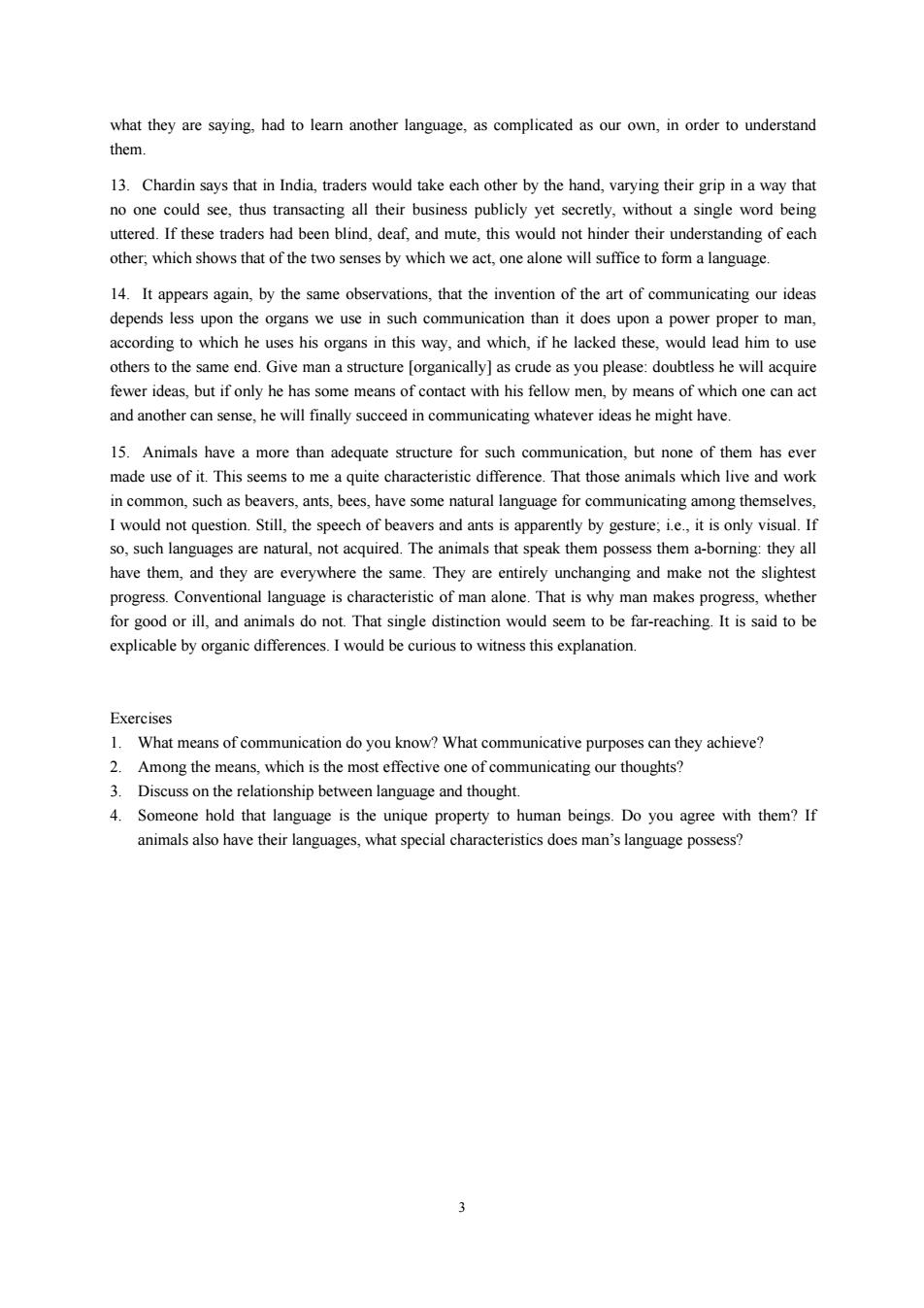正在加载图片...

what they are saying,had to learn another language,as complicated as our own,in order to understand them. 13.Chardin says that in India,traders would take each other by the hand,varying their grip in a way that no one could see,thus transacting all their business publicly yet secretly,without a single word being uttered.If these traders had been blind,deaf,and mute,this would not hinder their understanding of each other;which shows that of the two senses by which we act,one alone will suffice to form a language 14.It appears again,by the same observations,that the invention of the art of communicating our ideas depends less upon the organs we use in such communication than it does upon a power proper to man, according to which he uses his organs in this way,and which,if he lacked these,would lead him to use others to the same end.Give man a structure [organically]as crude as you please:doubtless he will acquire fewer ideas,but if only he has some means of contact with his fellow men,by means of which one can act and another can sense,he will finally succeed in communicating whatever ideas he might have. 15.Animals have a more than adequate structure for such communication,but none of them has ever made use of it.This seems to me a quite characteristic difference.That those animals which live and work in common,such as beavers,ants,bees,have some natural language for communicating among themselves, I would not question.Still,the speech of beavers and ants is apparently by gesture;i.e.,it is only visual.If so,such languages are natural,not acquired.The animals that speak them possess them a-borning:they all have them,and they are everywhere the same.They are entirely unchanging and make not the slightest progress.Conventional language is characteristic of man alone.That is why man makes progress,whether for good or ill,and animals do not.That single distinction would seem to be far-reaching.It is said to be explicable by organic differences.I would be curious to witness this explanation. Exercises 1.What means of communication do you know?What communicative purposes can they achieve? 2.Among the means,which is the most effective one of communicating our thoughts? 3.Discuss on the relationship between language and thought 4.Someone hold that language is the unique property to human beings.Do you agree with them?If animals also have their languages,what special characteristics does man's language possess?3 what they are saying, had to learn another language, as complicated as our own, in order to understand them. 13. Chardin says that in India, traders would take each other by the hand, varying their grip in a way that no one could see, thus transacting all their business publicly yet secretly, without a single word being uttered. If these traders had been blind, deaf, and mute, this would not hinder their understanding of each other; which shows that of the two senses by which we act, one alone will suffice to form a language. 14. It appears again, by the same observations, that the invention of the art of communicating our ideas depends less upon the organs we use in such communication than it does upon a power proper to man, according to which he uses his organs in this way, and which, if he lacked these, would lead him to use others to the same end. Give man a structure [organically] as crude as you please: doubtless he will acquire fewer ideas, but if only he has some means of contact with his fellow men, by means of which one can act and another can sense, he will finally succeed in communicating whatever ideas he might have. 15. Animals have a more than adequate structure for such communication, but none of them has ever made use of it. This seems to me a quite characteristic difference. That those animals which live and work in common, such as beavers, ants, bees, have some natural language for communicating among themselves, I would not question. Still, the speech of beavers and ants is apparently by gesture; i.e., it is only visual. If so, such languages are natural, not acquired. The animals that speak them possess them a-borning: they all have them, and they are everywhere the same. They are entirely unchanging and make not the slightest progress. Conventional language is characteristic of man alone. That is why man makes progress, whether for good or ill, and animals do not. That single distinction would seem to be far-reaching. It is said to be explicable by organic differences. I would be curious to witness this explanation. Exercises 1. What means of communication do you know? What communicative purposes can they achieve? 2. Among the means, which is the most effective one of communicating our thoughts? 3. Discuss on the relationship between language and thought. 4. Someone hold that language is the unique property to human beings. Do you agree with them? If animals also have their languages, what special characteristics does man’s language possess?